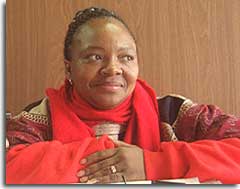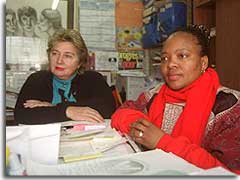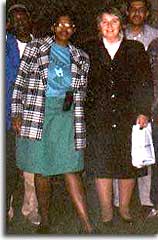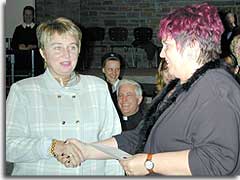 |
| Normalizwe
Dube, from Johannesburg, South Africa, opened the first Day Care Center
of Apoyo Familiar in South Africa in one of the poorest townships
in the outskirts of the city. Normalizwe Dube aus Johannesburg, Südafrika, eröffnete die erste Kindertagesstätte von Apoyo Familiar in Südafrika in einem der ärmsten Townships am Rand der Stadt. |
 |
| Dr. Ana Mon
(l), of La Plata, Argentina, member of the Schoenstatt Federation
of Families, founder and president of Apoyo Familiar, invited Norma
Dube to come to Argentina for a week and study the way how the Day
Care Centers work. Dr. Ana Mon (l), La Plata, Argentinien, Mitglied des Schönstatt-Familienbundes, Gründerin und Präsidentin von Apoyo Familiar, lud Norma Dube nach Argentinien ein, um eine Woche die Arbeitsweise der Tagesstätten kennen zu lernen. |
 |
| In May 2001,
Dr. Ana Mon visited South Africa to find out where centers could be
opened; here she met with Angie Boland to discuss the foundation of
Apoyo Familiar South Africa. Im Mai 2001 besuchte Dr. Ana Mon Südafrika, um zu erkunden, wo sich Möglichkeiten für Zentren anbieten würden; mit Angie Boland plante sie die Gründung von Apoyo Familiar Südafrika. |
| Fotos: Apoyo Familiar © 2001 |
 |
| November 30,
2000: Renate Reddemann, "Helft uns leben" (Rhein-Zeitung), presenting
the $5,000 check to Ana Mon. Two centers could be opened in South
Africa with this money. 30. November 2000: Renate Reddemann, "Helft uns leben" (Rhein-Zeitung) überreicht Ana Mon den Scheck über 10.000 DM. Mit dem Geld konnten zwei Zentren in Südafrika errichtet werden. |
| Foto: POS, Brehm © 2001 ARCHIV |
(mkf) The upcoming anniversary of the night in Schoenstatt when Dr. Ana Mon, founder of "Apoyo Familiar," received a $ 5.000 donation from "Helft uns leben" was a reason for her to send an e-mail to Gabi Novak-Oster and Renate Reddemann. The two journalists of the Rhein-Zeitung had intended to give enough money from the paper's foundation for one new day care center for children of extremely poor families, the first day care center that Apoyo Familiar would thus be able to open in South Africa. Dr. Ana Mon, a lawyer and mother of five adult sons and a member of the Schoenstatt Federation of families, at the end of November had to pass on the surprise news that not one but two houses had opened.
"Thank you for the donation of $5,000 that you gave us last year," she wrote, "that we used for two Centers in South Africa." The two centers in South Africa, opened by Angie Boland in Sowto, Kliptown, and Normalizwe Dube, in Alexandria, Johannesburg, are the first ones that Apoyo Familiar – recently nominated for the Nobel Peace Prize 2002 by Parents' Forum, Cambridge - launched outside of Latin America. Apoyo Familiar was born in the Shrine of the Father Nuevo Schoenstatt, in Florencio Varela, Argentina, on October 18, 1984, fruit of the longing of Ana Mon for a mission. "Esperanza" (hope) was the day care center for children from extremely poor families that she opened in 1984. She wanted to keep these children from ending up on the streets, lost in the hopelessness of crime, abuse, prostitution, organ trafficking, drug addiction.
"All together let's offer them a better present so they can struggle for a better future"
It was only the beginning. The International Confederation of Family Support (C.I.A.F.) is today an International Organization with autonomous member organizations in Argentina, Uruguay, Mexico, Venezuela, South Africa, and India that works for extremely poor children and their families starting day care centers, craft workshops and small businesses. The primary reason is prevention: "We act before they are in the streets," says Ana Mon. "We keep them from malnutrition, not going to school, drugs, alcoholism, AIDS, violence, organ trafficking, prostitution, abuse. We want to support the family and help them struggle for a better future." The objectives of the International Confederation of Family Support is to provide services to all members of the family in need, particularly concentrating on the many poor children that are forced to be in the streets. Street children are a great problem because the poor families are often unable to take care of them financially, and they are sent out on the street hoping that they can find food and shelter on their own. Ana Mon started in Argentina (where Apoyo Familiar has 165 Centers) and continued in Uruguay, Peru, Venezuela and Mexico. In 2001 she went to India and Africa.
The children are cared for during the day in centers called "Casitas del Niño y la Familia" (Houses of Children and Family}, with workshops and small businesses to sustain the centers. The children are given nourishing food and shelter and are provided with an education that is appropriate for their age. These Centers are private, apolitical and ecumenical.
Opened on October 12 thanks to "Helft uns leben": The Dr. Ana Mon Centre in Soweto
In Soweto/Kliptown, Angie Boland opened a center called "Dr. Ana Mon Centre" on October 12 on the outskirts of Johannesburg. It was decided that Apoyo Familiar South Africa would also support an already existing day nursery in a squatters' camp. Feisal Gathoo, the treasurer of the group, wrote: "There is a place that caters to the poorest of the poor children. But they do not have books, chairs, tables, toys and basic meals for these starving children. Apoyo Familiar has decided to assist them and make this our second center." In February, Angie Boland had traveled to Argentina and studied the work of the Day Care Centers in La Plata and Mendoza. The area where the house could be opened with the financial support of the Rhein-Zeitung is extremely poor. The center started supporting three families with children ages 7 to 13 years.
Passionately caring for the Abandoned Children: Norma Dube
The other Center that could be opened with the donation of the Rhein-Zeitung in Bramley/Alexandria has already more that 50 children who get a chance for a future with dignity. Normalizwe Dube visited Argentina in June 2001 after she had met with Dr. Ana Mon on her travels to South Africa in May. But already before the first meeting of the committee and the directors for the future center had taken place, the day care center started on May 24, 2001. No time to lose. Norma smiles: "With what I learned in Argentina, I opened the doors for 20 more children! I started working with the needy people a long time ago, and I have been feeding them from my pocket and from the food I beg from our church and other workmates," Norma shared. "I feed the street kids in a nearby town called Hillbrow; they sleep in the streets, and they do not have places to stay or to bathe. On the other hand, I am trying to find better accommodations for them. Every year in June when winter begins, I give then blankets to keep them warm although they will be on the streets." In January 2001, when she first got notice of Apoyo Familiar and the possibility of starting this project in Africa, she was thrilled. "The home that I opened is close to the poorest township where the majority of the people there make a living in the "informal" sector as hawkers, selling vegetables and second hand clothes. In these townships, there is a high criminal rate -- there are drug addicts, alcohol abuse. This has provoked family violence, abuse and rape. The home I have opened is for these children. To start with, I have black children; but my wish is to have all the races because in all races there are poor children who need to be cared for."
When you Open Such a Center, the Doors are Never Closed….
"I started with two families because Dr. Ana Mon said I have to start with only a few children and grow slowly but surely," Norma continues, "but unfortunately what I discovered is that when you open such a center, the doors are never closed. Parents bring children from all directions and you can't say 'no' to them". The children receive breakfast in the morning, then go to school, have lunch, do their home work and support, are served dinner or sandwiches before going home. Some get money from churches for their school fees, especially the grade school children. Norma Dube: "The volunteers were happy with cooking and spending time with the children, and I was there all the time trying to make ends meet. Anyway, it was not easy; but with my efforts and the efforts of my committee members, all went well, especially with the continuous support of Dr. Ana Mon."
"Dr. Ana Mon gave me a donation of $2,500. When I came back from Argentina, I would have liked to open more centers, and I had done so. I opened more centers withour really having any way to support them. The $2,500 made a big difference - without it I wouldn’t be where I am today. I express my million thanks again to "Helft uns leben" from Germany and to Dr. Ana Mon."
Meanwhile, Norma Dube has 65 children in the Day Care Center, from eight months to six years. "It is difficult when someone brings a child. You cannot refuse the responsibility of accepting the child in the Center…"
Norma Dube could not ignore the need of the poorest ones. She opened another Center in Thembisa, where she cares for 50 children at the moment, "but still more will be coming." Norma Dube has to struggle with the money, but "with God's love we are still going on and surviving. Life is difficult in South Africa. The parents also try to help. They bring things like tomatoes, onions and cabbage; and for them it is a big donation."
The Onontuthuko Community Developers
On August 18, 2001 Norma Dube started a club with a group of mothers with children in the day care centers and others, the Onontuthuko Community Developers. Onontuthuko means Motivation. It consists of a group of 30 ladies who are willing to learn. Norma Dube: "We are teaching them how to sew fitted sheets, chair covers, curtains, toilet sets, pillows and pillow cases, and clothes for the children, for us to sell and raise money. I have only one hand machine and an over-locking machine so some cut the parts and some tuck them, others sew them using machines. One of my neighbors loaned us the machines, and she helps by teaching the ladies how to use those machines. Then we take the money and buy food for the children and pay rent for the two centers."
If She Would Be Asked for a Christmas Gift…
If you asked Dr. Ana Mon for a Christmas wish, she would not hesitate to name a gift, clearly and with conviction: "$10,000" - not for a small car, but: "We could start four new centers in Africa if we had the money, one in Malawi, one in Zimbabwe, one in Zambia, and one in Kenya."
English edition: Joan Biemert, New Franken, WI, USA